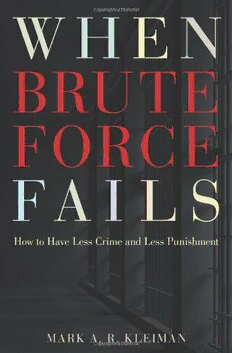Download When Brute Force Fails: How to Have Less Crime and Less Punishment PDF Free - Full Version
Download When Brute Force Fails: How to Have Less Crime and Less Punishment by Mark A. R. Kleiman in PDF format completely FREE. No registration required, no payment needed. Get instant access to this valuable resource on PDFdrive.to!
About When Brute Force Fails: How to Have Less Crime and Less Punishment
Since the crime explosion of the 1960s, the prison population in the United States has multiplied fivefold, to one prisoner for every hundred adults--a rate unprecedented in American history and unmatched anywhere in the world. Even as the prisoner head count continues to rise, crime has stopped falling, and poor people and minorities still bear the brunt of both crime and punishment. When Brute Force Fails explains how we got into the current trap and how we can get out of it: to cut both crime and the prison population in half within a decade. Mark Kleiman demonstrates that simply locking up more people for lengthier terms is no longer a workable crime-control strategy. But, says Kleiman, there has been a revolution--largely unnoticed by the press--in controlling crime by means other than brute-force incarceration: substituting swiftness and certainty of punishment for randomized severity, concentrating enforcement resources rather than dispersing them, communicating specific threats of punishment to specific offenders, and enforcing probation and parole conditions to make community corrections a genuine alternative to incarceration. As Kleiman shows, ''zero tolerance'' is nonsense: there are always more offenses than there is punishment capacity. But, it is possible--and essential--to create focused zero tolerance, by clearly specifying the rules and then delivering the promised sanctions every time the rules are broken. Brute-force crime control has been a costly mistake, both socially and financially. Now that we know how to do better, it would be immoral not to put that knowledge to work.
Detailed Information
| Author: | Mark A. R. Kleiman |
|---|---|
| Publication Year: | 2009 |
| ISBN: | 9780691142081 |
| Pages: | 256 |
| Language: | English |
| File Size: | 1.066 |
| Format: | |
| Price: | FREE |
Safe & Secure Download - No registration required
Why Choose PDFdrive for Your Free When Brute Force Fails: How to Have Less Crime and Less Punishment Download?
- 100% Free: No hidden fees or subscriptions required for one book every day.
- No Registration: Immediate access is available without creating accounts for one book every day.
- Safe and Secure: Clean downloads without malware or viruses
- Multiple Formats: PDF, MOBI, Mpub,... optimized for all devices
- Educational Resource: Supporting knowledge sharing and learning
Frequently Asked Questions
Is it really free to download When Brute Force Fails: How to Have Less Crime and Less Punishment PDF?
Yes, on https://PDFdrive.to you can download When Brute Force Fails: How to Have Less Crime and Less Punishment by Mark A. R. Kleiman completely free. We don't require any payment, subscription, or registration to access this PDF file. For 3 books every day.
How can I read When Brute Force Fails: How to Have Less Crime and Less Punishment on my mobile device?
After downloading When Brute Force Fails: How to Have Less Crime and Less Punishment PDF, you can open it with any PDF reader app on your phone or tablet. We recommend using Adobe Acrobat Reader, Apple Books, or Google Play Books for the best reading experience.
Is this the full version of When Brute Force Fails: How to Have Less Crime and Less Punishment?
Yes, this is the complete PDF version of When Brute Force Fails: How to Have Less Crime and Less Punishment by Mark A. R. Kleiman. You will be able to read the entire content as in the printed version without missing any pages.
Is it legal to download When Brute Force Fails: How to Have Less Crime and Less Punishment PDF for free?
https://PDFdrive.to provides links to free educational resources available online. We do not store any files on our servers. Please be aware of copyright laws in your country before downloading.
The materials shared are intended for research, educational, and personal use in accordance with fair use principles.

